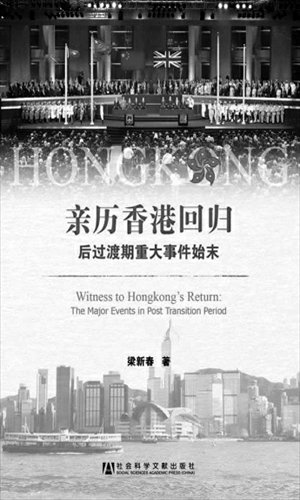Hong Kong nostalgia for undemocratic colonial period misplaced

Since early this year, there have been some Hongkongers who have waved the flag of British Hong Kong and called for "Hong Kong independence." This slogan has even gained some support on the Internet in Hong Kong. These protesters said that they pursue "true autonomy" in Hong Kong. They hold British Hong Kong flags, which some believe symbolizes their adherence to the colonial period.
Witness to Hongkong's Return: the Major Events in Post Transition Period, written by Leung Sun-Chun and published in October 2012, provides a particular viewpoint on this question.
Leung is the former vice president and editorial writer of the Ta Kung Pao, the oldest active Chinese language newspaper based in Hong Kong, which has been funded by the Chinese mainland government since 1949.
According to Leung, the UK insisted on making trouble for the Chinese mainland around the period of the returning of Hong Kong.
It provoked confrontation in economics, politics and law between Hong Kong and the mainland.
Leung cites many examples to support his arguments such as governor Chris Patten's reforms and UK's alleged manipulation of the 1994 and 1995 elections. He argues the UK took various actions to interrupt the preparatory work of the special administrative region.
Against the background of the UK's uncooperative actions, Leung claims the Chinese mainland government took the initiative to rely on and cooperate with Hongkongers to eliminate external interference and prepare for the establishment of the special administrative region.
Leung has sketched his imaginative version of the story in Hong Kong during that transition period, which he personally witnessed as editor of the Ta Kung Pao.
His book reviews the electoral process of the preparatory committee and provisional legislative council.
It also records many events where he singles out some Hongkongers' welcome and feelings of pride about the handover.
Leung argues that it was the Chinese mainland government who committed to safeguarding democracy process in Hong Kong while it was the UK who wanted to damage it.
British Hong Kong was a colonial period. Under colonial rule, Hongkongers did not have full basic rights, not to mention democracy.
The author believes that nostalgia for the period of British Hong Kong is just caused by the narrowing of the gap between the Chinese mainland and Hong Kong, and that the declining sense of superiority of Hongkongers was deliberately made use of by interested parties.
He dismisses or ignores the arguments made by the protesters themselves: that they wave the flags as a symbol of how Hong Kong's rule of law, free speech, and independent spirit are derived from UK traditions. Leung instead believes that it is absurd for people to call for greater democracy while simultaneously waving the flags of the colonial era.